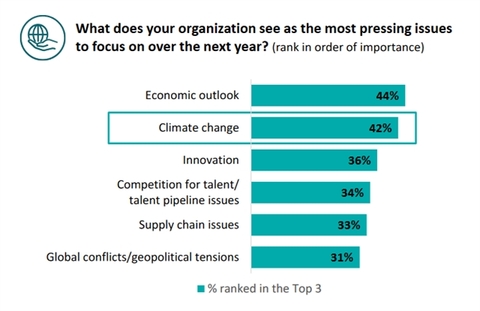
When asked to rank the issues most pressing to their organisations, many CxOs rated climate change as a “top-three issue,”. Only economic outlook ranked slightly higher. — Photo Deloitte’s 2023 CxO Sustainability Report
C-level business leaders (CxOs) view climate change as a top priority for their organisations amid global uncertainty, Deloitte’s 2023 CxO Sustainability Report: Accelerating the Green Transition has shown.
When asked to rank the issues most pressing to their organisations, many CxOs rated climate change as a “top-three issue,” ahead of seven others, including innovation, competition for talent, and supply chain challenges. Only economic outlook ranked slightly higher.
Moreover, 75 per cent of CxOs said their organisations had increased their sustainability investments over the past year, nearly 20 per cent of whom said they’d increased investments “significantly.”
Deloitte built upon past research by surveying more than 2,000 CxOs across 24 countries to gauge concerns and actions from business leaders on climate change and sustainability.
The report also identifies key recommendations for organisations to help close the gap between ambition and impact to accelerate progress to a low-carbon economy.
“If there was any doubt that climate change is an enduring part of the business agenda, the increased focus on sustainability by leaders over the past year should put it to rest," said Deloitte Global CEO Joe Ucuzoglu. "In a year of continued uncertainty, disruption, and competing business challenges, leaders ranked climate change as a top issue.”
“The path to a more sustainable future will take time, it will require business investment, and it will be driven by new and innovative technologies and creative approaches. It is promising to see that C-suite leaders are making sustainability a priority and increasing their investments to help lead the way. ”
Optimism endures despite heightened concern around climate impact
Almost every CxO surveyed said their organisation had felt the impacts of climate change over the past year.
CxOs reported “resource scarcity/cost of resources” as the top issue already impacting their companies (46 per cent), while 45 per cent highlighted “changing consumption patterns or preferences related to climate change” and 43 per cent reported “regulation of emissions” as other top issues impacting their companies.
Despite these concerns, 78 per cent of leaders were “somewhat” or “extremely” optimistic the world would take sufficient steps to avoid the worst effects of climate change.
Deloitte’s survey found that organisations were feeling broad pressure to act on climate change from across their stakeholder groups.
Sixty-eight per cent of CxOs said they felt a large-to-moderate degree of pressure from each of the following groups: board members and management, regulators and government, and consumers and clients.
Organisations were also feeling pressure from their shareholders and investors (66 per cent), employees (64 per cent), and civil society (64 per cent).
In line with last year’s report, CxOs chose brand recognition and reputation, customer satisfaction, and employee morale and well-being as three of the four top benefits of their companies’ sustainability efforts, suggesting many CxOs see climate actions as a way to strengthen stakeholder relationships.
Climate action continues, but challenges remain
Organisations are taking action. According to the survey fifty-nine per cent are using more sustainable materials, 59 per cent are increasing energy use efficiency, 50 per cent are training employees on climate change, and 49 per cent are developing new climate-friendly products or services.
However, as seen last year, companies are less likely to implement actions that demonstrate they have embedded climate considerations into their cultures and have the senior leader's buy-in and influence to effect meaningful transformation.
For example, 21 per cent of CxOs indicated their organisations had no plans to tie senior leader compensation to environmental sustainability performance, and 30per cent said they had no plans to lobby the Government for climate initiatives.
Additionally, when asked how serious certain groups were about addressing climate change, only 29 per cent of CxOs said they believed the private sector was “very” serious.
Nearly a quarter of CxOs said the difficulty of measuring their organisations’ environmental impact was a top barrier to increased action, and nearly one-fifth cited cost and focused on near-term issues as barriers.
Deloitte’s report offers several recommendations to help CxOs get started, including embedding climate goals into their business’s overall strategy and purpose, building trust by taking credible climate actions, empowering the board, encouraging stakeholder action, investing in today’s (and tomorrow’s) technologies, and collaborating to drive systems-level change.
“CxOs in Viet Nam have also felt the impacts of climate change on their businesses. Businesses may have different challenges and concerns, but they all need to twist their mindset to take more urgent climate actions,” noted Tran Thuy Ngoc, Sustainability & Climate Leader.
“We hope that the CxO 2023 report will provide useful information such as recommendations to build comprehensive action plans and specific actions that organisations around the world are undertaking so Vietnamese businesses can build up their own sustainability journey to transition to a better future,” she said. — VNS